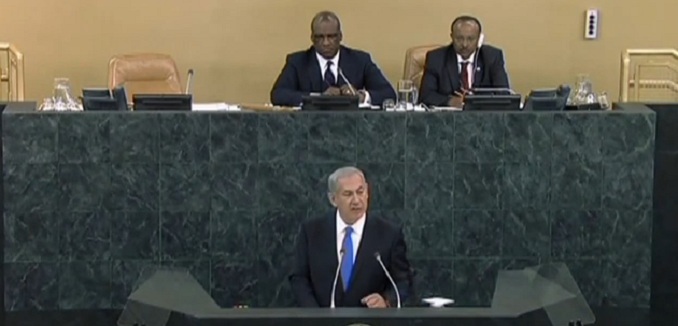Analysis of Israeli reactions to Netanyahu’s speech has been tangled. The BBC, for instance, asserted that “Israeli media [was] unconvinced by PM Netanyahu’s UN speech” and then linked to an article in which Israeli media outlets were quoted expressing doubts that the international community would be convinced by Netanyahu’s speech.
The BBC may have ran out of space before it could draw the distinction between doubts expressed by Israeli media outlets regarding the resoluteness of the international community, and praise for the prime minister’s speech. Multiple articles and editorials in Israel’s largest dailies praising the speech for frankness, accuracy, and tactical sophistication.
The editorial Yedioth Aharonot, the traditional market-leading newspaper in Israel, was effusive:
“Netanyahu was convincing in every word he said and did not need any gimmicks, drawings, flamboyant gestures or bombastic pronouncements. Yesterday he seemed – and this is not a printing mistake – trustworthy… Netanyahu’s speech was good because it was well based. His claims were accompanied by facts and quotation… the sanctions, which may certainly be credited to Netanyahu, are what have led to what seems like a strategic change in Iran.”
In Israel HaYom, which has traded off with Yedioth for the top slot in Israel’s market, Foreign News Editor Boaz Bismuth struck a similar note:
The prime minister chose a serious, tough and disillusioned speech; almost extraordinary during a time when the world seems to be more interested in fantasy. Iranian President Hasan Rouhani provided that in spades in his speech last week. Netanyahu took it upon himself on Tuesday to do the unpleasant thing and show us the harsh reality that is the Iranian nuclear program. It was not the speech the world wanted to hear, but it was the speech it needed to hear. Netanyahu was not looking to make friends in his speech Tuesday. He was looking to give the world the truth — and the truth sometimes hurts. Clearly, the world would rather live in the Iranian bubble, which Netanyahu came to burst Tuesday.
Veteran Israeli journalist Dan Margalit, writing in the same paper, noted subtle tactical moves made in the speech:
Netanyahu sounded firm, but also cautious, about the military option. His demand for a complete dismantlement of Iran’s nuclear program, rather than drawing another red line based on enrichment, was a wise move. However, it does exact a price from Israel. Ultimately, no Israeli prime minister wants to act alone to defend the world from Iran, but Netanyahu pledged to do so if necessary. It is likely that Obama, watching Netanyahu’s speech, could accept almost every sentence in it (the demand for the complete dismantlement of Iran’s military nuclear program and opposition to interim deals that would ease sanctions without removing the Iranian nuclear threat).
Ari Shavit, a senior correspondent and editorial board member at the left-leaning Ha’aretz, teased out the distinction which has caused consternation in some coverage, that is between Israeli reactions to the speech its international reception. He contrasted Netanyahu’s approach with “a world that refused to listen,” and concluded that Israel has gone all-in on stopping Iranian nuclear weapons acquisition:
Prime Minister Benjamin Netanyahu’s speech to the UN General Assembly Tuesday night very different from his previous ones… Once again, Bibi was telling the truth. Once again Bibi was analyzing the strategic situation precisely. But this time even he didn’t believe that someone would listen to him. He didn’t even try to score an emotional goal and conquer the audience. In almost morosely quiet tones he said what he had to say to a world that refused to listen…. The people of Israel have come home never to be uprooted again, Netanyahu said – and he meant every word. All or nothing, he said. All or nothing.
[Photo: CBN News / YouTube]




